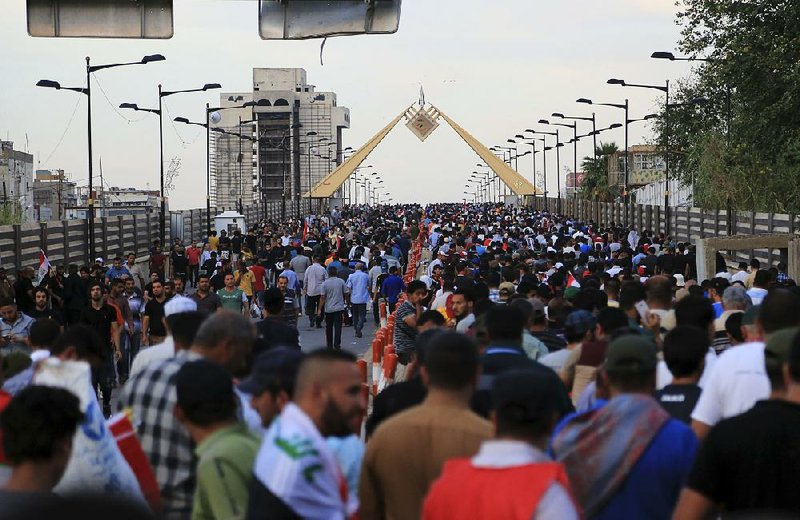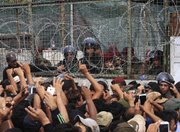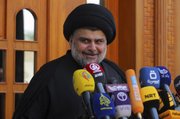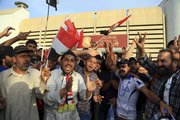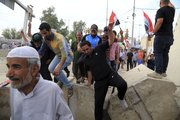BAGHDAD -- A state of emergency was declared Saturday after protesters burst into Baghdad's fortified Green Zone, where key buildings -- including the U.S. Embassy -- are located, and stormed Iraq's parliament.
Live footage on Iraqi television showed swarms of people, who have been demanding an overhaul of the government, in the parliament building, waving flags, chanting and breaking furniture. Outside, they smashed car windows.
Some lawmakers were berated and beaten with flags as they fled the building. Others were holed up in rooms in parliament, trapped and in fear for their lives, lawmakers said.
Baghdad Operations Command said all roads into the capital had been closed. Organizers of the demonstration urged protesters not to attack embassies.
Officials at the U.S. Embassy were monitoring the situation, an emailed statement said.
"Under the Vienna Convention, all diplomatic missions are protected by the host country's security forces," the email said. "We have full confidence that the Iraqi Security Forces will meet its obligations."
The embassy also denied that it had begun evacuating staff members or had provided safe haven for Iraqi politicians.
The U.N. mission to Iraq said it was "gravely concerned." It issued a statement condemning violence against elected officials and urging "calm, restraint and respect for Iraq's constitutional institutions at this crucial juncture."
The surge of protesters into the secure area, which is off-limits to most Iraqis, was the culmination of months of street demonstrations.
Iraqi Prime Minister Haider al-Abadi, who has pledged to give minority Sunnis and Kurds a bigger role in the Shiite-dominated government, has faced resistance to replacing politicians in key roles. He's also under fire for his handling of a financial crisis and charges of government corruption.
Al-Abadi's efforts to meet the demands of the demonstrators have been hampered by a divided parliament, where sessions have descended into chaos as lawmakers have thrown water bottles and punches at one another. Parliament canceled its April session.
The political unrest has created a new level of instability in a country that is facing multiple crises, including a struggling economy and the fight against Islamic State militants.
"This is a new era in the history of Iraq," TV footage shows one demonstrator screaming in the main lobby of the parliament. Another says, "They have been robbing us for the past 13 years."
At the heart of the protesters' demands is an end to the political quota system, which was put in place after the U.S.-led invasion in 2003 and in which positions are shared out among sects. Powerful Shiite cleric Muqtada al-Sadr has demanded a new technocratic government, in which decision-makers are selected on the basis of their expertise and backgrounds.
"This is an end to the political system put in place after 2003," said Shwan al-Dawoodi, a Kurdish lawmaker. "A big part of the blame for this is on America, which left Iraq without solving this crisis it created."
Earlier Saturday, not enough lawmakers had showed up in parliament to officially convene a session, during which al-Abadi was to present names for a reshuffling of the Cabinet.
The session was postponed until the afternoon.
"That's it for Abadi," said parliamentarian Hisham al-Suhail, who said dozens of lawmakers were exchanging messages saying the prime minister is not fit to run the country. "What's happened has ruined everything we've built over the last 13 years. The Green Zone represents the whole government of Iraq."
Meanwhile, al-Sadr, a leader in the resistance to the U.S. troop presence in Iraq after the U.S.-led invasion, held a news conference in the southern city of Najaf.
He criticized the country's politicians, saying "They are against reform, they hope to behead the will of the Iraqi people. ... I'm with the people, no matter what they decide. I'm standing and waiting for a major uprising of the Iraqi people."
Shortly afterward, protesters -- many of them al-Sadr loyalists -- pushed through the multiple security cordons around parliament. Cellphone videos uploaded to social media showed dozens of young men running through the halls of parliament, calling for the government to disband.
"We are all with you [al-Sadr]," one group of men yelled as they entered the building's main chamber.
Rumors swirled that lawmakers -- many of whom live in the Green Zone -- were trying to flee the city.
Ammar Toma, a politician with the Shiite Fadhila Party who had criticized lawmakers for earlier staging a sit-in in parliament, was accosted as he tried to leave the building, video footage showed.
"Hit him! Hit him!" one protester shouted.
One video posted online showed protesters riding around on a military vehicle.
Leaders of Iraq's elite counterterrorism forces, which have in the past been called on to reinforce security in the capital, said they are standing down for now.
"We still view this as a demonstration," said Sabah al-Numan, a spokesman for the counterterrorism forces. "We aren't taking any part in this as it's not something regarding terrorism."
He added, however, that if the unrest escalates, his forces may be forced to intervene to "protect the legitimacy of the government."
Al-Dawoodi said protesters had tried to attack him and his car as he fled from parliament, and that lawmakers had panicked as they heard that protesters had broken in. Five Kurdish parliamentarians were among members of other political blocs who were holed up inside Saturday afternoon, he said.
"They have locked themselves inside rooms and are scared for their lives," he said. He blamed the prime minister for putting their lives at risk after television reports cited al-Abadi as saying he had demanded that protesters be allowed into the Green Zone. Al-Abadi's office issued a statement denying the allegation.
Later in the evening, security officers fired tear gas and warning shots to prevent more people from entering the enclave.
By nightfall, the protesters were leaving parliament and gathering in the Green Zone section called Celebration Square, an area with a statue of giant crossed swords that was once a parade ground for Saddam Hussein's forces. The protesters seemed to be settling in there for the night, and al-Abadi said the "security situation in Baghdad is under control."
"We are in the highest degree of readiness," said Col. Ibrahim al-Baydani, a spokesman for the military, noting that Baghdad was already on high alert because of a Shiite pilgrimage.
The Islamic State attempted to bomb pilgrims on the route Saturday morning. Unable to get near the pilgrims, a suicide bomber detonated a truck bomb among crowds at a sheep market instead, said an official whose name was not given. The attack killed at least 21 people and wounded at least 42 others, according to Iraqi police and hospital officials.
"The enemy might try to take advantage of the exceptional situation of the country to carry out attacks inside the capital," the official said, adding that commanders on the street had been given the authority to set up checkpoints or close roads as they see fit, without permission from central command.
U.S. officials have said they are concerned that the political crisis will have a negative effect on the country's fight against the Islamic State, which has been the focus of a flurry of high-level visits in recent weeks.
"Now is not the time for government gridlock or bickering," President Barack Obama said of the crisis in Iraq during a visit to Saudi Arabia last week. He, too, said he was "concerned" about the situation.
"Our focus remains the defeat of ISIL," Col. Steve Warren, a spokesman for the U.S. military, tweeted Saturday, using an alternative acronym for the Islamic State. "Our operations continue, and we have not been interrupted."
Protest organizers said the demonstrators would remain in parliament in a peaceful sit-in and had been directed not to attack lawmakers or property.
"What happened today was an explosion of the people," said Hussain al-Sharifi, a parliamentarian with al-Sadr's bloc. "Today was an uprising, a revolution."
Street protests began last summer, as thousands demonstrated over a lack of services, and government waste and corruption. Al-Abadi, pressured to cut spending because of plunging oil prices, embarked on ambitious changes but has struggled to enact any meaningful change.
Positioning himself as a crusader for change, al-Sadr called his followers to the streets in a show of force earlier this year.
Information for this article was contributed by Loveday Morris of The Washington Post; by Susannah George of The Associated Press; by Khalid Al-Ansary of Bloomberg News; and by Falih Hassan, Omar Al-Jawoshy and Tim Arango of The New York Times.
A Section on 05/01/2016
